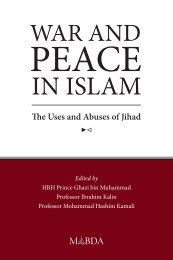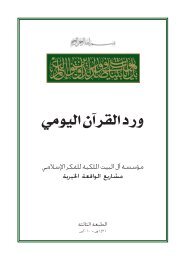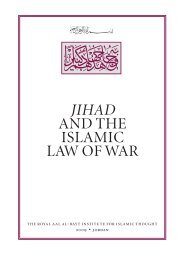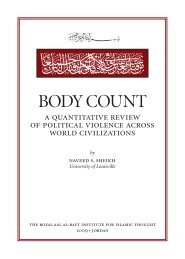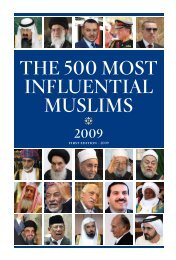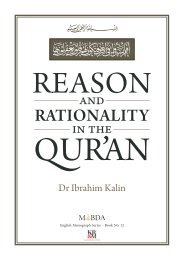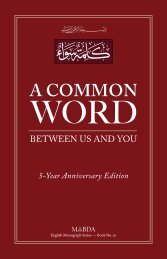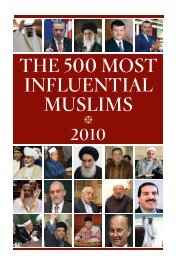Al-W¥^idÏ's Asb¥b al-Nuz‰l - The Royal Islamic Strategic Studies ...
Al-W¥^idÏ's Asb¥b al-Nuz‰l - The Royal Islamic Strategic Studies ...
Al-W¥^idÏ's Asb¥b al-Nuz‰l - The Royal Islamic Strategic Studies ...
You also want an ePaper? Increase the reach of your titles
YUMPU automatically turns print PDFs into web optimized ePapers that Google loves.
Chapter 66: Surah <strong>al</strong>-Tahrim<br />
In the name of <strong>Al</strong>lah, the Beneficent, the Merciful<br />
(O Prophet! Why bannest thou that which <strong>Al</strong>lah hath made lawful for thee…) [66:1].<br />
Muhammad ibn Mansur <strong>al</strong>-Tusi informed us> ‘<strong>Al</strong>i ibn ‘Umar ibn Mahdi> <strong>al</strong>-Husayn ibn Isma‘il <strong>al</strong>-<br />
Mahamili> ‘Abd <strong>Al</strong>lah ibn Shabib> Ishaq ibn Muhammad> ‘Abd <strong>Al</strong>lah ibn ‘Umar> Abu’l-Nadr, the client<br />
of ‘Umar ibn ‘Abd <strong>Al</strong>lah> ‘<strong>Al</strong>i ibn ‘Abbas> Ibn ‘Abbas> ‘Umar who said: “<strong>The</strong> Messenger of <strong>Al</strong>lah, <strong>Al</strong>lah<br />
bless him and give him peace, entered the house of Hafsah <strong>al</strong>ong with the mother of his son, Mariyah.<br />
When Hafsah found him with her [in an intimate moment], she said: ‘Why did you bring her in my<br />
house You did this to me, to the exception of <strong>al</strong>l your wives, only because I am too insignificant to you’.<br />
He said to her: ‘Do not mention this to ‘A’ishah; she is forbidden for me [i.e. Mariyah] if I ever touch<br />
her’. Hafsah said: ‘How could she be forbidden for you when she is your slave girl’ He swore to her that<br />
he will not touch her and then said: ‘Do not mention this incident to anyone’. But she went ahead and<br />
informed ‘A’ishah. <strong>The</strong> Prophet, <strong>Al</strong>lah bless him and give him peace, decided not to go to his wives for a<br />
month. He stayed away from them twenty nine days when <strong>Al</strong>lah, glorious and ex<strong>al</strong>ted is He, reve<strong>al</strong>ed (O<br />
Prophet! Why bannest thou that which <strong>Al</strong>lah hath made lawful for thee, seeking to please thy wives)”. 1<br />
Abu Ibrahim Isma‘il ibn Ibrahim <strong>al</strong>-Wa‘iz informed us> Bishr ibn Ahmad ibn Bishr> Ja‘far ibn <strong>al</strong>-Hasan<br />
<strong>al</strong>-Firyabi> Minjab ibn <strong>al</strong>-Harith> ‘<strong>Al</strong>i ibn Mushir> Hisham ibn ‘Urwah> his father> ‘A’ishah who said:<br />
“<strong>The</strong> Messenger of <strong>Al</strong>lah, <strong>Al</strong>lah bless him and give him peace, used to like sweet and honey. It was <strong>al</strong>so<br />
his habit to go to his wives after finishing the ‘Asr prayer. In one occasion he went to Hafsah bint ‘Umar<br />
and stayed with her more than he usu<strong>al</strong>ly did. When I found out about this, I enquired about the reason<br />
and I was told that a woman from her clan gifted her with a pot of honey which she offered to the<br />
Prophet, <strong>Al</strong>lah bless him and give him peace. I said to myself: by <strong>Al</strong>lah I will spoil it for him. I said to<br />
Sawdah bint Zam‘ah: ‘When he comes to your apartment and draws closer to you, say: O Messenger of<br />
<strong>Al</strong>lah, did you eat Maghafir’ 2 When he says: ‘Hafsah fed me some honey’, say: ‘<strong>The</strong> bees which produced<br />
it must have eaten the ‘Urfut’. 3 I will say the same thing, and you, Safiyyah, should say the same’. Sawdah<br />
said: ‘By <strong>Al</strong>lah, the moment he stood at the door I was about to begin what she commanded me to do’.<br />
When he drew closer to her she said: ‘O Messenger of <strong>Al</strong>lah, did you eat Maghafir’ ‘No!’ he replied. She<br />
said: ‘<strong>The</strong>n, what is this smell on you’ He said: ‘Hafsah fed me some honey!’ she said: “<strong>The</strong> bees which<br />
produced it must have eaten the ‘Urfut’. When he came to me, I said the same thing. And when he went<br />
to Safiyyah she <strong>al</strong>so repeated the same thing. When it was Hafsah’s turn and the Prophet went to her, she<br />
said to him: ‘O Messenger of <strong>Al</strong>lah, sh<strong>al</strong>l I feed you some of that honey’ He said: ‘I do not feel like it!’<br />
Sawdah said: ‘Glory be to <strong>Al</strong>lah, we have deprived him [of honey]’. But I said to her: ‘Be quiet!’ ” 4 This<br />
was narrated by Bukhari from Farwah ibn Abi <strong>al</strong>-Maghra’, and <strong>al</strong>so by Muslim from Suwayd ibn Sa‘id ;<br />
and both Farwah and Suwayd related it from ‘<strong>Al</strong>i ibn Mushir.<br />
Abu ‘Abd <strong>al</strong>-Rahman ibn Abi Hamid informed us> Zahir ibn Ahmad> <strong>al</strong>-Husayn ibn Muhammad ibn<br />
Mus‘ab> Yahya ibn Hakim> Abu Dawud> ‘Amir <strong>al</strong>-Khazzaz> Ibn Abi Mulaykah who related that Sawdah<br />
bint Zam‘ah had relatives from her mother’s side in the Yemen who used to gift her honey. Among<br />
<strong>al</strong>l the wives of the Prophet, <strong>Al</strong>lah bless him and give him peace, Hafsah and ‘A’ishah were very close to<br />
each other. One of them said to the other: “Do you not see this He goes to her when it is not her turn just<br />
to have some of that honey. So when he comes to you hold your nose, and when he asks you about the<br />
reason, say: I smell something in you that I do not know what it is. When he comes to me, I sh<strong>al</strong>l say the<br />
same thing”. When the Prophet, <strong>Al</strong>lah bless him and give him peace, went to her she held her nose. He<br />
1<br />
Tabari, :155-156; Qurtubi, :178; Durr, :214-215.<br />
2<br />
<strong>The</strong> Maghafir is a sweet herb or gum with a bad odour.<br />
3<br />
A plant which smells like wine.<br />
4<br />
Qurtubi, :177.



